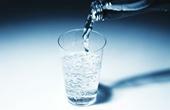Water

Entered into the body water does not all evaporate through the skin. It takes part not only in metabolic processes, but also in stabilizing body temperature. During intense loads, as in hot weather, the body cools by evaporating part of the available moisture. Therefore, the amount of water a person needs depends on the intensity of the load, physical preparation and climate, and ranges from three to ten liters of water per day, and in some cases even more.
Part of the water is excreted from the body together with urine. And in the case of drinking a liter of water at once, only about 60% of it will go to provide thermoregulation of the body, and the remaining 40% will be excreted in the urine. But in the case of a gradual intake of water into the body of 100-150 ml every hour, then up to 90% of water will separate from sweat. Hence, we can conclude that in the heat or when performing heavy physical work it is more advantageous to drink often, but in small quantities.
It is better to drink water in small sips or through a tube, adding to it citric acid, various extracts and dried juices or sports drinks such as "Olympia" and "Tsedevit."You can also use fruit syrups and well-proven pops that can easily be made from citric acid and soda with various additives. Cold tea( preferably green) also excellently removes thirst, like a solution of concentrated tomato juice or tomato paste. In extreme cases, water can be drunk with sweets, sugar or eating it with dried fruits. The feeling of thirst disappears only 10 to 15 minutes after drinking, when water is absorbed into the blood, so too much drink not only does not quench thirst, but, on the contrary, often provokes its intensification.
The content of table salt in the blood is 9.45 g per liter. Salt is excreted from the body together with sweat in smaller amounts( about 5 g of salt per 1 liter of sweat).That is, with abundant perspiration in the blood increases the salt content. The reaction to the violation of salt balance is a feeling of thirst, the body tends to reduce the concentration of salt in the blood. But in the case of a large amount of drunk water, the concentration of salt in the blood drops so significantly that in order to restore it, excess moisture from the body is removed with urine and plentiful sweat. Together with them more salt is taken away. Salt stocks of the body are very limited, and in case of their depletion the concentration of salt in the blood is not replenished. A consequence of this is an additional removal of moisture and, together with it, salts. The loss of water causes a thirst again and the circle closes.
Some positive effect in the fight against thirst can be given by the addition of water, but in the presence of heavy physical exertion in the heat, increased salt intake reduces sweating, thereby disrupting thermoregulation, causing heat strokes and provoking heart failure.
Materials used:
Shilov VN, Mits'yo VP"Healthy food"
